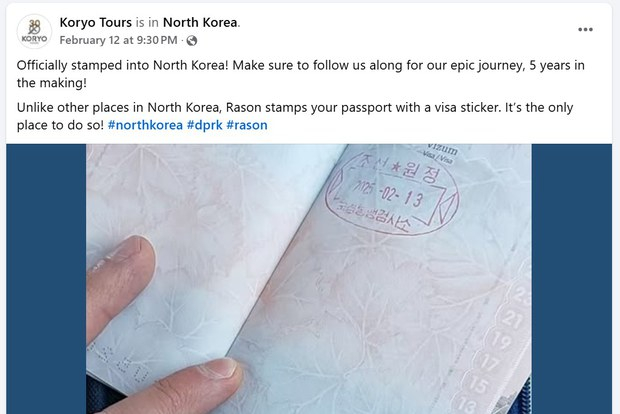That’s because tourists who undertake trips to the recently reopened Rason special economic zone, located in the far northeast of the peninsula, will likely end up with a North Korean entry stamp in their passports — a mark that could catch the attention of U.S. immigration officials.
Normally, the United States allows the citizens of 42 countries, including South Korea, Australia and Britain, to enter and stay for up to 90 days without applying for a visa if they are traveling for tourism or business purposes and have been cleared by its Electronic System for Travel Authorization (ESTA).
However, the United States ended visa-free entry in 2019 for nationals of these countries who have visited North Korea on or after March 1, 2011.

That decision came two years after the first Donald Trump administration banned U.S. citizens from visiting North Korea in response to the death of American college student Otto Warmbier, who was held captive by the regime for over a year and released in a comatose state in June 2017.In an advisory posted to its website earlier this month, British-owned travel agency Koryo Tours, which is based in Beijing, reminded prospective tourists that joining a trip to North Korea could complicate their future visits to the United States.
“People from countries that are normally eligible for the [U.S.] Visa Waiver Program [using ESTA] will now have to apply for a U.S. visa in order to visit the United States if they have visited North Korea since 2011,” the agency noted.
Though individuals who have visited the North in recent years can travel to the United States if they obtain a visa, they are still likely to face questions and even rejection from U.S. consular officials who review their applications, according to past media reports.
A typical 10-year U.S. tourism or temporary business visa also costs $185, whereas a two-year ESTA clearance costs $21.
In the past, it was possible for intrepid travelers to conceal their trips to North Korea from hawk-eyed U.S. immigration officials because the regime issued visas in the form of foldable paper cards via its embassy in Beijing, the departure point of most direct flights to Pyongyang.
![American independent filmmaker Justin Martell poses in front of a poster celebrating former North Korean leader Kim Jong-il's birthday inside the Rason special economic zone on Feb. 16. Martell told CNN he obtained a citizenship from Saint Kitts and Nevis to bypass the U.S. State Department's ban on travel to the North by its citizens. [SCREEN CAPTURE]](https://koreajoongangdaily.joins.com/data/photo/2025/02/24/2977822c-9873-4d52-8adb-720c52d33ddd.jpg)
These visas, also called tourist cards, were stamped upon entry but not physically attached or glued onto pages of visitors’ passports.
They were also collected by North Korean authorities when tourists flew out from Pyongyang’s Sunan International Airport.
However, the North Korean capital remains closed to foreign tourists.
Instead, all current and upcoming group tours to the North are limited to the Rason area, which groups such as Koryo Tours enter by crossing the Wonjong Bridge over the Yalu River.
Koryo Tours and other travel agencies announced earlier this month that the North had granted foreign tour groups permission to enter for the first time since the regime closed its borders at the beginning of the Covid-19 pandemic in January 2020.
While visitors to the Rason region only need to obtain prior electronic approval for entry, their passports are stamped by North Korean border officials, leaving a permanent record of their trip.
But citizens of South Korea and the United States need not worry — travel agencies that organize group tours to the North do not accept tourists from either country due to restrictions by their governments.
BY MICHAEL LEE [lee.junhyuk@joongang.co.kr]




